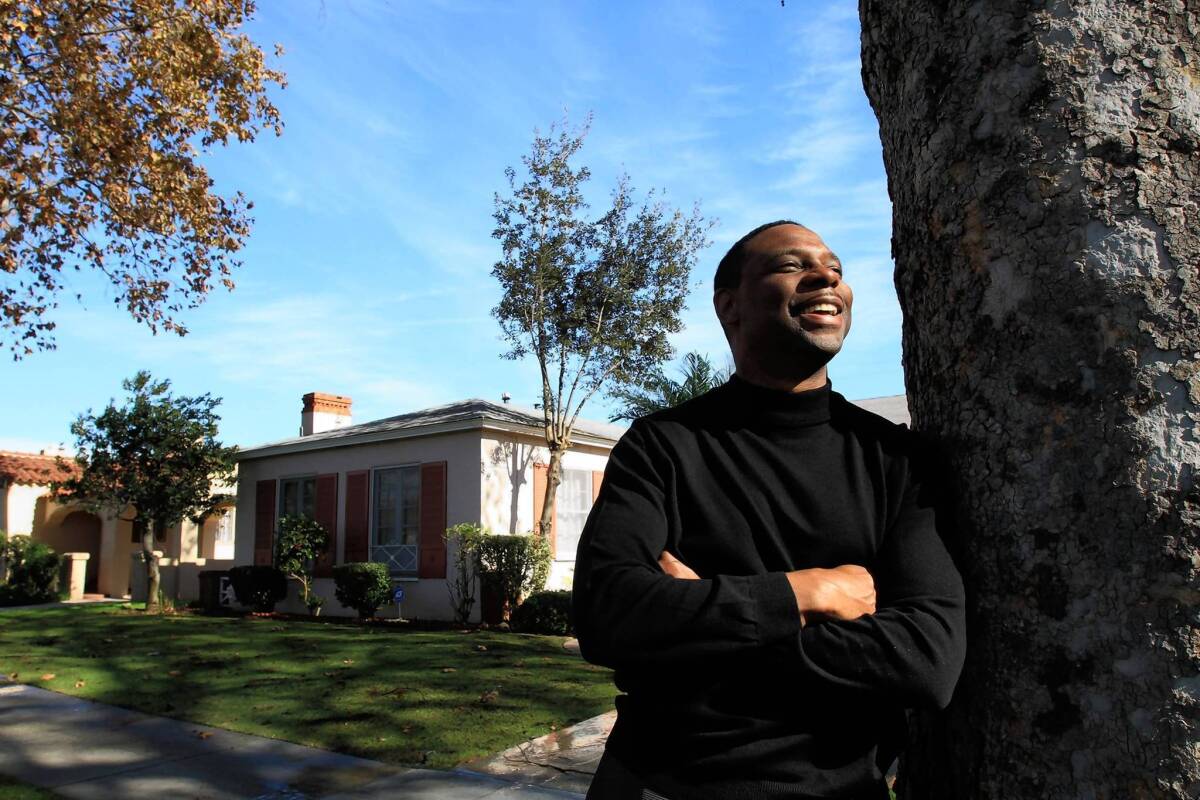Letting strangers live rent-free in his house: cool or crazy?

When Tony Tolbert turned 50 last year, he marked the occasion by moving in with his mother.
The decision wasn’t about money. He’s a Harvard-educated attorney, on the staff of UCLA’s law school. And it wasn’t because his mother wanted or needed him home.
It was Tolbert’s response to the sort of midlife milestone that prompts us to take stock. Instead of buying a sports car, he decided to turn his home — rent free — over to strangers.
He’d been inspired by a magazine article about a family that sold their house, squeezed into a tiny replacement and donated to charity the $800,000 proceeds from the sale.
“It just struck me how powerful a gesture that was,” Tolbert said. “It challenged me to think about what I could do, where I might have some overflow in my life.”
His overflow was a modest home on a quiet tree-lined street a short walk from Crenshaw Boulevard. He’d lived there alone for 10 years.
Last January, he moved out and a young single mother with three little children moved in. A South Los Angeles domestic violence program chose the family from its shelter and brokered the deal.
He agreed to let her pay one dollar a month, and imposed on her only one rule: “Whatever has to happen to keep things drama free, that’s what I need you to do.”
When Tolbert first shared his story with me, he wanted me to write about it but not name him. He didn’t want publicity. He just hoped that, since he’d gotten the idea from something he’d read, maybe someone reading my column would be inspired to … do what?
Let strangers take over their homes rent-free?
I figured he was either crazy, very rich or hopelessly naive.
That was last summer, when he didn’t know himself how the experiment would work out. There were times, he said, when he wondered if his leap of faith had gone a step too far.
“A couple of friends said ‘You’re out of your mind.’ But others said ‘That’s great.’”
His mother worried that he was being too trusting — and didn’t exactly relish the idea of sharing space with her grown son for the first time in 30 years.
But he’d grown up in a family where sharing your blessings mattered.
So Tolbert left the good furniture for the woman who moved in. He didn’t hide his grandmother’s heirloom quilt or put away the fine art.
“I told her straight out, this is my home. I’m leaving these things for you to enjoy. I want you to be comfortable here.”
That was a learning process for Tolbert: “It was a good exercise in not grasping and hanging on to stuff.... Short of them burning the house down, I had to accept that whatever they tear up, it can also be repaired.”
And he had to accept that generosity and gratitude aren’t always a matched pair.
“I had all kinds of preconceived notions about how this would play out. We would meet, she would be weeping, want to give me a big hug.... I had to learn to detach, not be attached to any particular outcome or course.”
The woman was thankful but not effusive. They barely talked the entire year.
But when the woman’s tenure ended and the family moved out, Tolbert felt good enough to look for another family to give his house to.
::
Reflecting on what set him on this path, Tolbert realizes that it wasn’t as simple as a magazine article. His whole life, he said, his parents have modeled generosity.
His mother and sister are practicing Buddhists and share its concepts with him. “I’ve learned about how karma works,” he said. “Blessings flow from making sure that others are taken care of.”
His father, one of the city’s early African American entertainment lawyers, was diagnosed with Alzheimer’s 15 years ago and lives in a nursing home.
“This is, in some way, an extension of his philosophy,” Tolbert told me. “Growing up, I can’t remember a time when there wasn’t someone other than family living with us — clients of my father, friends of friends. He was always willing to open up our home to someone in need.”
Like the folks in the magazine article, Tolbert’s family has grown closer in the past year. He lives with his mother in one unit of a West Los Angeles duplex he owns; his sister lives in the other.
When he told them he plans to continue the arrangement next year, “they were very supportive.”
Even his job reinforces his charitable notions. He helps run the outreach program at UCLA’s law school and teaches a course called “Street Law.” “A large part of my job is to help equalize the playing field in the legal profession,” he said. “Why shouldn’t I do that in my life?”
When word got out on campus about his project, a former student steered Tolbert to Alexandria House, a Mid-Wilshire shelter for homeless women and children. Shelter Director Judy Vaughan had a tenant in mind:
Felicia Dukes and her three children have shared a single bedroom at Alexandria House since February. They landed at the shelter after she lost her teaching job, fell behind on rent and got evicted from their Inglewood apartment.
Now they’re packing to move next weekend into Tolbert’s three-bedroom home. Dukes can barely believe it: “Who opens their arms out to strangers in this day and age?” she said.
Her 11-year-old daughter tallied the blessings more explicitly: She’ll be able to have her own bedroom, shoot hoops in the backyard with her brother, invite friends to her birthday party.
“To live in your house is a miracle,” she wrote, in a thank-you letter to Tolbert. “You are like an angel from God.”
They were working out details last week when Dukes read her daughter’s letter aloud. Tolbert took off his glasses and wiped his eyes. Emotion choked his voice: “It’s a blessing for me to be able to share with you, and to partner with Alexandria House.”
Tolbert doesn’t know how long this chain will go on. And I’m still not sure what to make of him. But it feels good to share his story.
“I’m just a regular dude,” he said. “I’m not brave. I’m not a millionaire, with houses to burn. I just wanted to do something to help somebody.”
More to Read
Start your day right
Sign up for Essential California for news, features and recommendations from the L.A. Times and beyond in your inbox six days a week.
You may occasionally receive promotional content from the Los Angeles Times.






